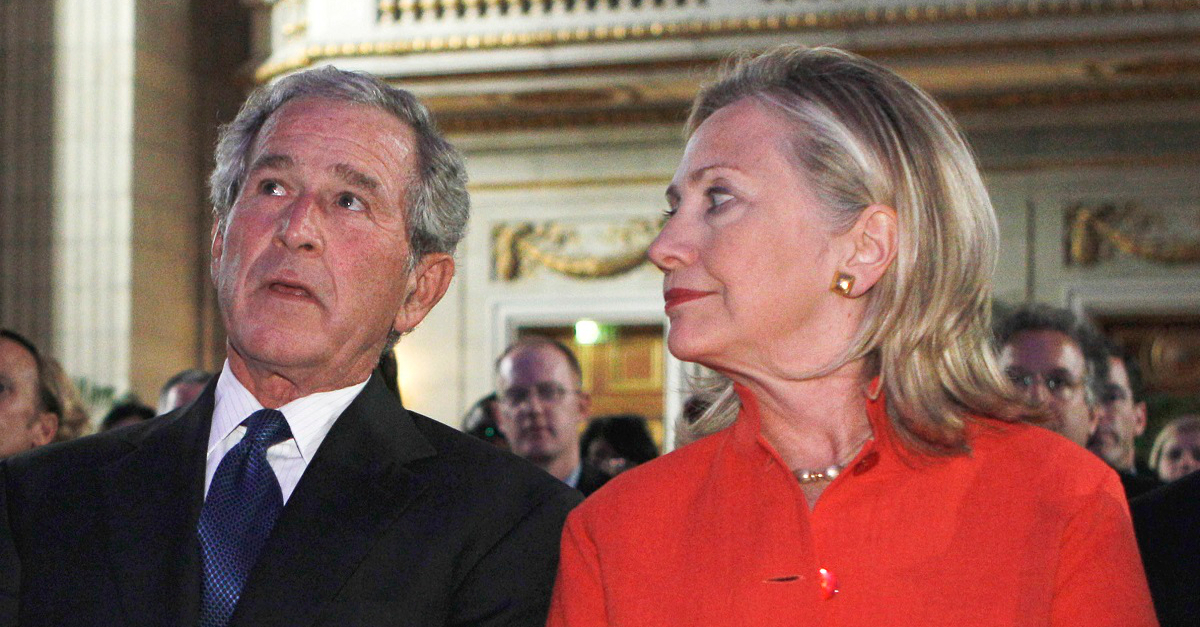Everyone in DC has an opinion on Hillary Clinton’s interview with The Atlantic’s Jeffrey Goldberg – the one in which she criticized Barack Obama’s handling of foreign policy.
Videos by Rare
The fallout produced a predictable display when the two met up on Martha’s Vineyard. They chatted and laughed together as though nothing was amiss. And, in case we missed it, both camps explained that nothing was amiss.
The performance reflects the delicate political balancing act that Clinton must execute. She must be careful not to offend the base of the Democratic Party that still adores Obama. At the same time, she hopes to differentiate herself from Obama’s policies, despite the fact that she had a hand in shaping them.
Clinton hopes to convince hawks in the center and right that she can be trusted to respond militarily to foreign policy crises, without losing the support of those on the left who abandoned her for Obama in 2008, in large measure because of her hawkishness.
It might be working. Her support for the Iraq war earns her a measure of respect from neoconservatives, many of whom still believe the war to have been a wise and noble enterprise. Her mea culpa for that vote seems to assuage the concerns of at least some on the left.
Beyond that crucial vote, however, Clinton’s comments to Goldberg represent the essence of the hawks’ critique: a big, important country like the United States needs an organizing principle, she explained, and “don’t do stupid [stuff]” doesn’t suffice.
This is a debatable point. An organizing principle isn’t necessarily superior to ad hocery. Many organizing principles have turned out to be flawed or immoral, or both (e.g. imperialism, racism, communism, totalitarianism, the list goes on).
Weighing the evidence on a case by case basis, and making judgments based on the specific circumstances that prevail at that particular moment, can work rather well. An organizing principle — some might call it ideology — might cloud rather than clarify one’s assessment of the facts, and the prudent courses of action.
But, even if one accepts her claim that the United States needs an organizing principle, the more relevant question is whether we need Hillary Clinton’s.
While cynics might argue that Clinton’s sole organizing principle is self-aggrandizement, the evidence suggests that her principles go beyond that. And some neoconservatives, who might not otherwise be expected to sing her praises, seem to agree.
A neoconservative foreign policy, as Reihan Salam explained earlier this year, is defined by “the belief that U.S. military primacy and U.S. global leadership are valuable and worth sustaining, and also that we ought to define our interests broadly rather than narrowly.”
This is what Clinton believes. Michael Tomasky, in a generally sympathetic review, calls Clinton version “muscular internationalism.” The key difference with neoconservatism, Tomasky contends, is that Clinton, like Obama, is less unilateral, more humble, and more aware of the limits of American military power.
On the particulars, however, Clinton has backed many of the neoconservatives’ favored policies.
But beyond Syria and Iraq, beyond the Afghan surge, beyond Benghazi I (the incident that precipitated U.S. involvement in Libya, and that Clinton supported) and Benghazi II (the attack on the U.S. consulate there that resulted in four Americans killed, and that Clinton runs away from), and beyond whether “muscular internationalism” is good for the country, the other question is whether Clinton’s hawkishness will be good for her politically.
Clinton’s foreign policy views are likely to be deeply unpopular with the majority of voters. We should recall, for example, that the public has always been overwhelmingly opposed to U.S. involvement in the Syrian civil war, a trend that is unlikely to reverse anytime soon.
Perhaps she is gambling that it doesn’t matter. This time around, she is unlikely to face off against a credible, charismatic, dovish challenger in the Democratic primary. She might not face any challenger at all. She might feel that she doesn’t need to hide her hawkish tendencies, confident that most Democrats will vote for her anyway.
But if she does secure the Democratic nomination, we might end up with the curious case of a hawkish liberal Democrat facing off against a less hawkish conservative Republican. The GOP nominee might, for example, criticize Clinton for her vote for war with Iraq in 2002, or question the wisdom of arming so-called Syrian moderates.
If the Republican nominee assails Hillary Clinton’s foreign policy, a foreign policy remarkably similar to that espoused by the neoconservatives, don’t be surprised if the people once known as “Scoop” Jackson Democrats, who bolted their party for the GOP in the early 1970s, change their allegiances again.



